Professional Ethics Report - Finance and Accounting Practices
VerifiedAdded on 2020/11/23
|13
|3947
|352
Report
AI Summary
This report delves into the realm of professional ethics within the finance and accounting sectors. It begins by outlining the fundamental principles of ethical behavior, including integrity, objectivity, competence, confidentiality, and professional conduct, and then explores the legal, regulatory, and ethical requirements affecting the field. The report emphasizes the crucial role of professional bodies in setting standards and providing guidance. It highlights the importance of adhering to codes of conduct for both individuals and organizations, while also addressing the risks of improper practices and the need for vigilance. The report further examines ethical behavior when interacting with clients, suppliers, and colleagues, emphasizing objectivity and maintaining a professional distance. It covers the significance of adhering to organizational policies, handling confidential information, and operating within the scope of one's professional expertise. The report also discusses reporting procedures for unethical behavior, inappropriate client conduct, and strategies for preventing ethical conflicts. Finally, it underscores the importance of an ethical approach to sustainability and the responsibilities of finance professionals in upholding sustainability principles.
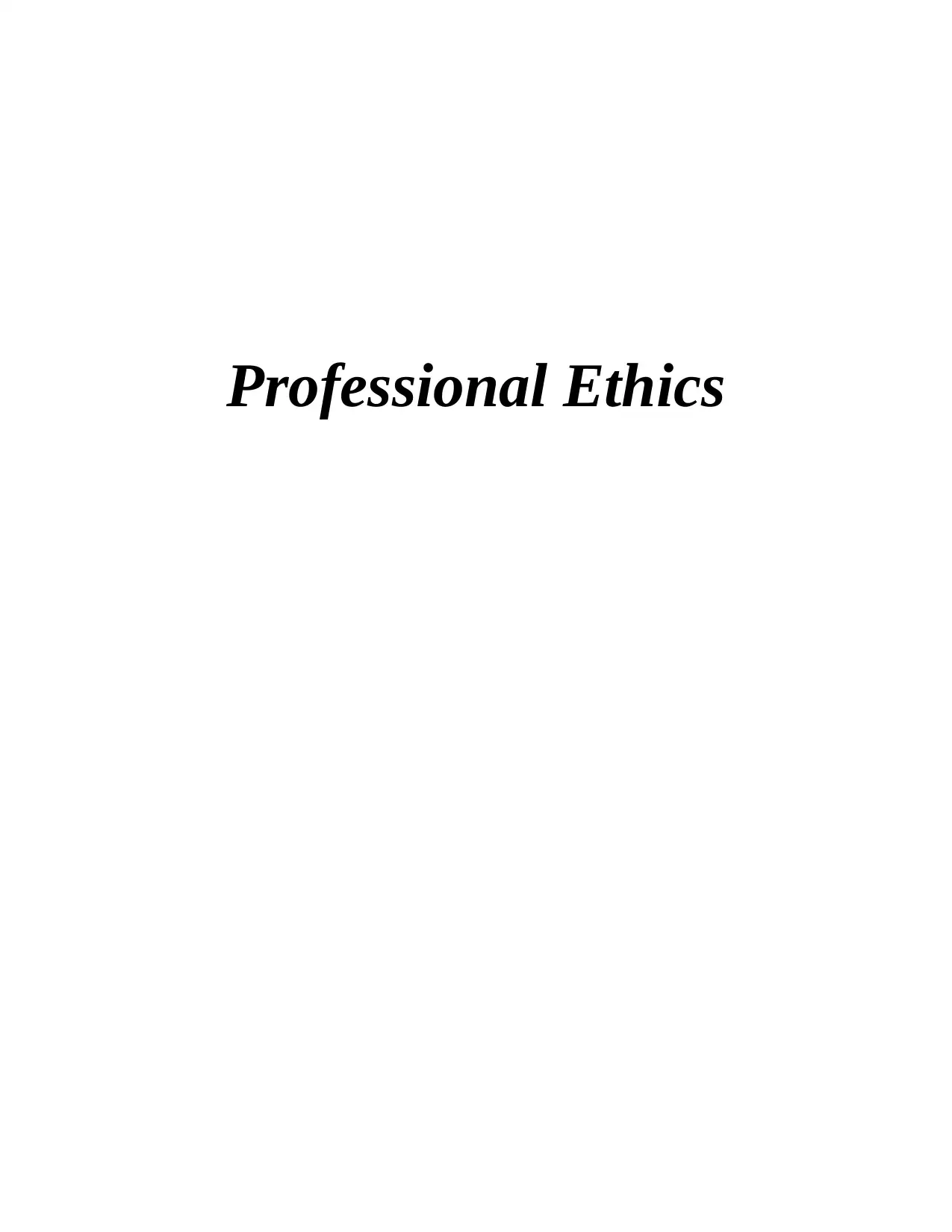
Professional Ethics
Paraphrase This Document
Need a fresh take? Get an instant paraphrase of this document with our AI Paraphraser
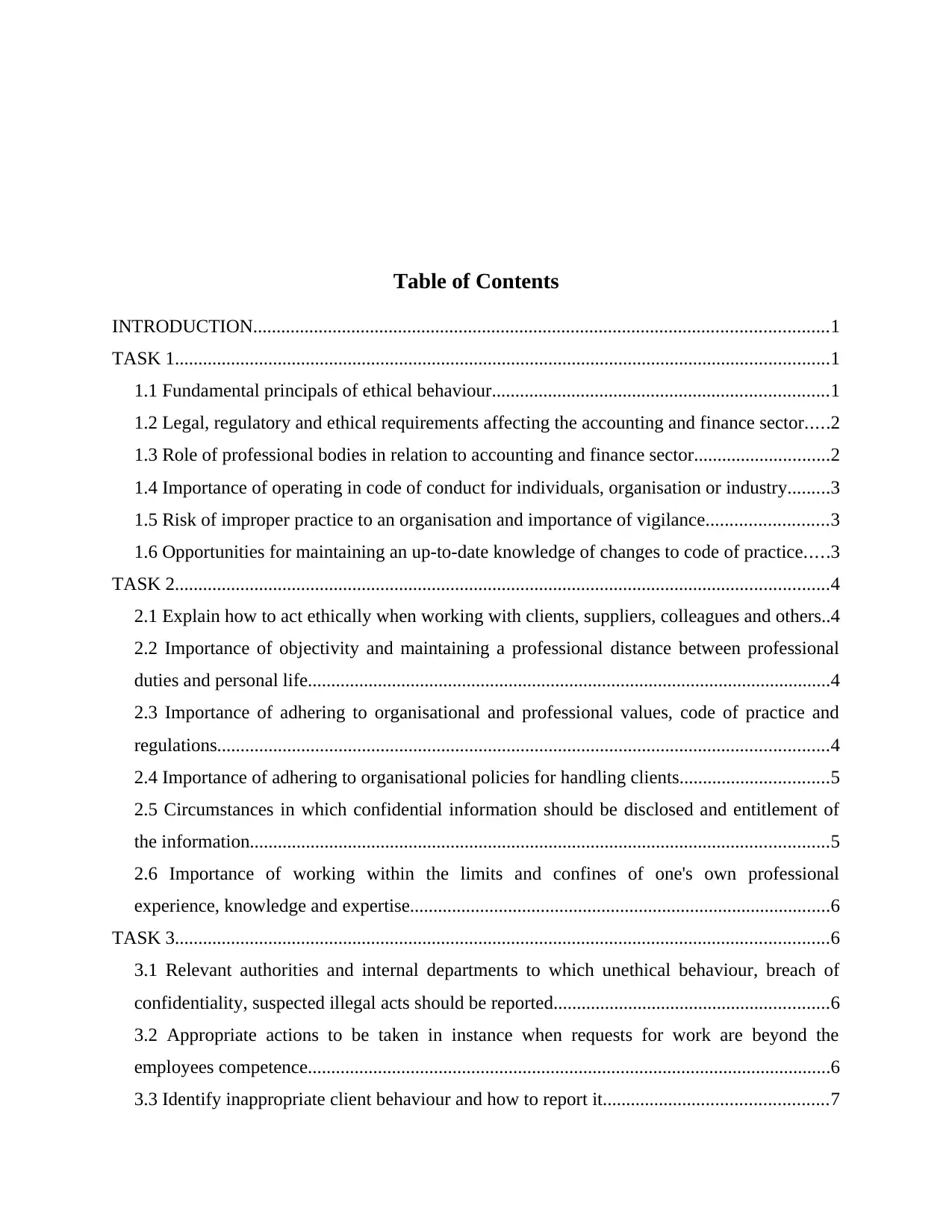
Table of Contents
INTRODUCTION...........................................................................................................................1
TASK 1............................................................................................................................................1
1.1 Fundamental principals of ethical behaviour........................................................................1
1.2 Legal, regulatory and ethical requirements affecting the accounting and finance sector.....2
1.3 Role of professional bodies in relation to accounting and finance sector.............................2
1.4 Importance of operating in code of conduct for individuals, organisation or industry.........3
1.5 Risk of improper practice to an organisation and importance of vigilance..........................3
1.6 Opportunities for maintaining an up-to-date knowledge of changes to code of practice.....3
TASK 2............................................................................................................................................4
2.1 Explain how to act ethically when working with clients, suppliers, colleagues and others..4
2.2 Importance of objectivity and maintaining a professional distance between professional
duties and personal life................................................................................................................4
2.3 Importance of adhering to organisational and professional values, code of practice and
regulations...................................................................................................................................4
2.4 Importance of adhering to organisational policies for handling clients................................5
2.5 Circumstances in which confidential information should be disclosed and entitlement of
the information............................................................................................................................5
2.6 Importance of working within the limits and confines of one's own professional
experience, knowledge and expertise..........................................................................................6
TASK 3............................................................................................................................................6
3.1 Relevant authorities and internal departments to which unethical behaviour, breach of
confidentiality, suspected illegal acts should be reported...........................................................6
3.2 Appropriate actions to be taken in instance when requests for work are beyond the
employees competence................................................................................................................6
3.3 Identify inappropriate client behaviour and how to report it................................................7
INTRODUCTION...........................................................................................................................1
TASK 1............................................................................................................................................1
1.1 Fundamental principals of ethical behaviour........................................................................1
1.2 Legal, regulatory and ethical requirements affecting the accounting and finance sector.....2
1.3 Role of professional bodies in relation to accounting and finance sector.............................2
1.4 Importance of operating in code of conduct for individuals, organisation or industry.........3
1.5 Risk of improper practice to an organisation and importance of vigilance..........................3
1.6 Opportunities for maintaining an up-to-date knowledge of changes to code of practice.....3
TASK 2............................................................................................................................................4
2.1 Explain how to act ethically when working with clients, suppliers, colleagues and others..4
2.2 Importance of objectivity and maintaining a professional distance between professional
duties and personal life................................................................................................................4
2.3 Importance of adhering to organisational and professional values, code of practice and
regulations...................................................................................................................................4
2.4 Importance of adhering to organisational policies for handling clients................................5
2.5 Circumstances in which confidential information should be disclosed and entitlement of
the information............................................................................................................................5
2.6 Importance of working within the limits and confines of one's own professional
experience, knowledge and expertise..........................................................................................6
TASK 3............................................................................................................................................6
3.1 Relevant authorities and internal departments to which unethical behaviour, breach of
confidentiality, suspected illegal acts should be reported...........................................................6
3.2 Appropriate actions to be taken in instance when requests for work are beyond the
employees competence................................................................................................................6
3.3 Identify inappropriate client behaviour and how to report it................................................7
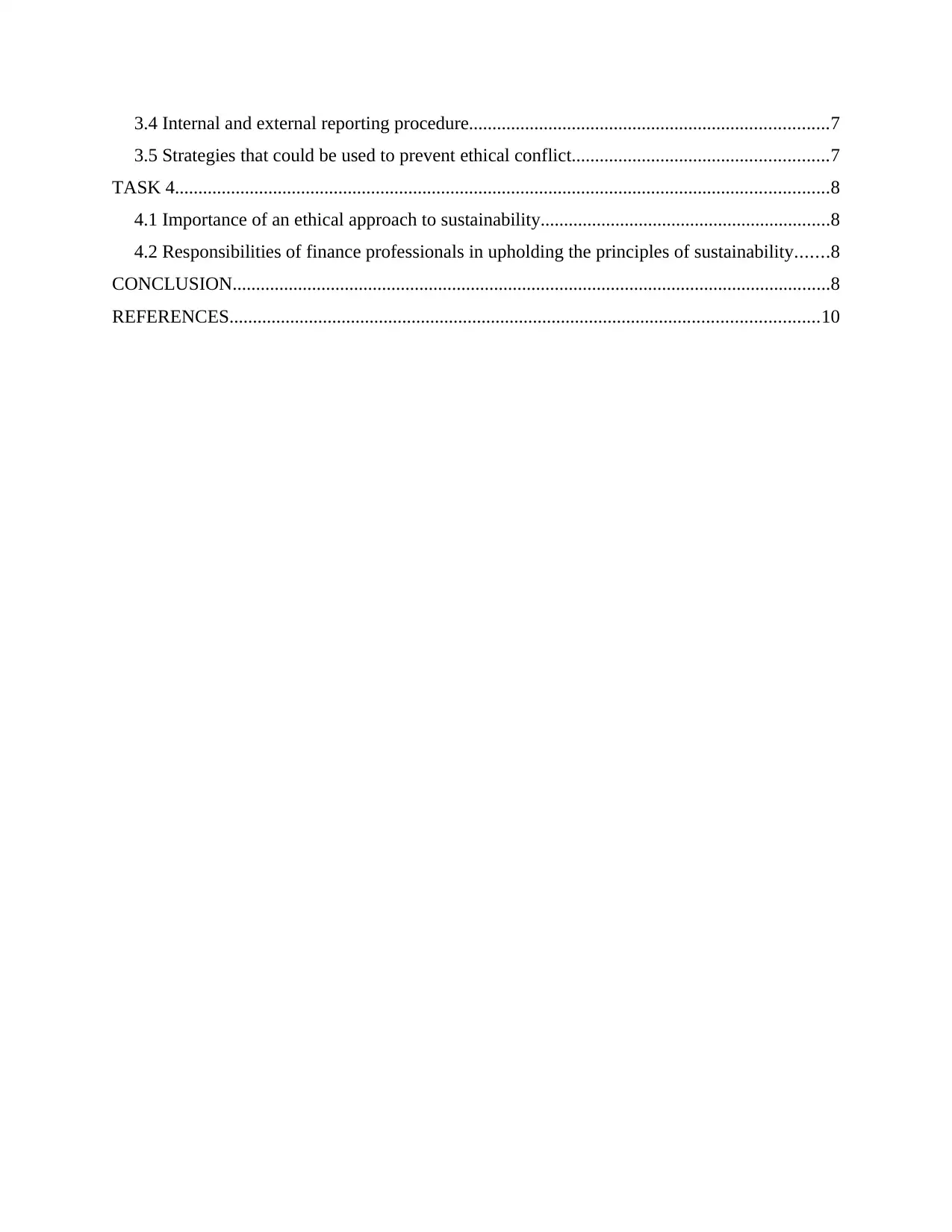
3.4 Internal and external reporting procedure.............................................................................7
3.5 Strategies that could be used to prevent ethical conflict.......................................................7
TASK 4............................................................................................................................................8
4.1 Importance of an ethical approach to sustainability..............................................................8
4.2 Responsibilities of finance professionals in upholding the principles of sustainability.......8
CONCLUSION................................................................................................................................8
REFERENCES..............................................................................................................................10
3.5 Strategies that could be used to prevent ethical conflict.......................................................7
TASK 4............................................................................................................................................8
4.1 Importance of an ethical approach to sustainability..............................................................8
4.2 Responsibilities of finance professionals in upholding the principles of sustainability.......8
CONCLUSION................................................................................................................................8
REFERENCES..............................................................................................................................10
⊘ This is a preview!⊘
Do you want full access?
Subscribe today to unlock all pages.

Trusted by 1+ million students worldwide
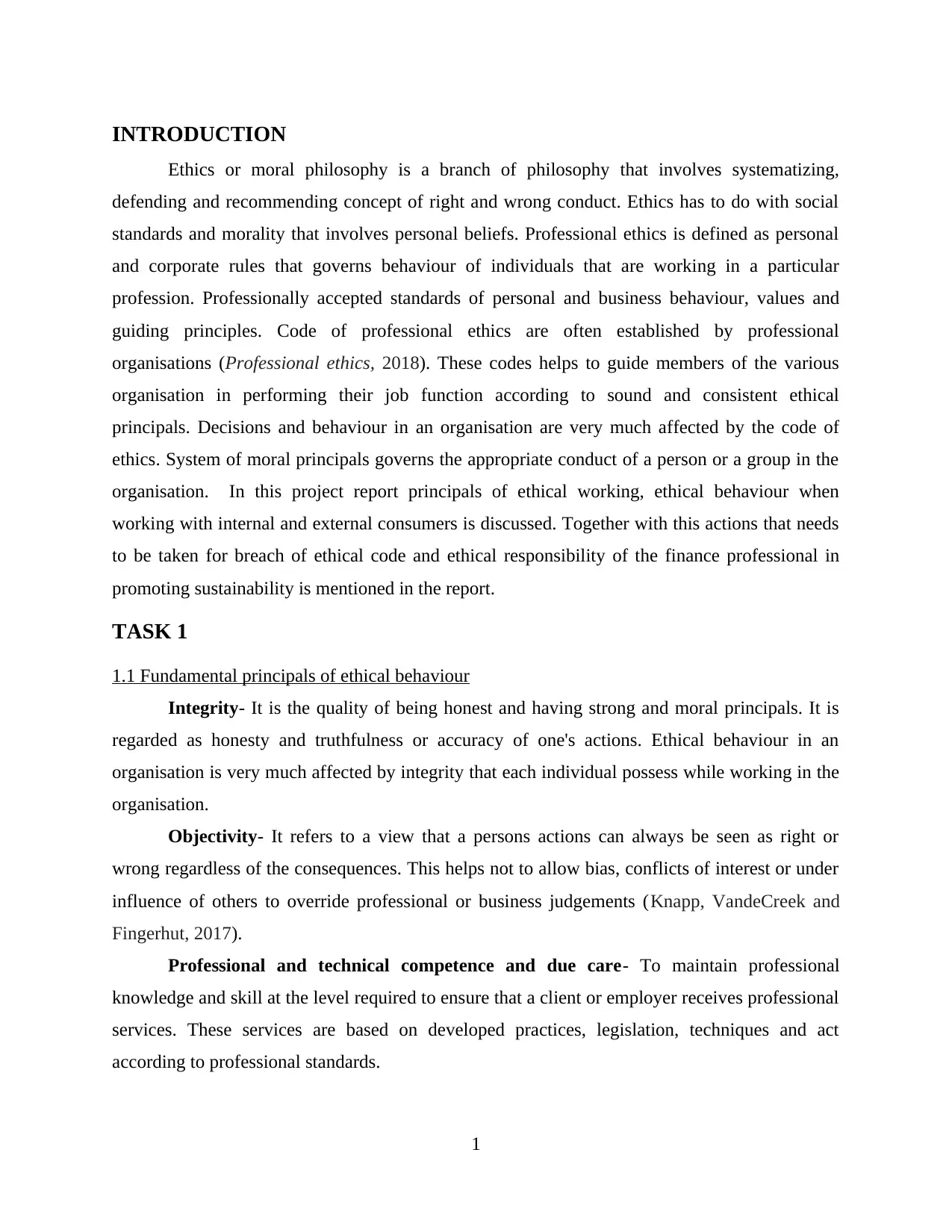
INTRODUCTION
Ethics or moral philosophy is a branch of philosophy that involves systematizing,
defending and recommending concept of right and wrong conduct. Ethics has to do with social
standards and morality that involves personal beliefs. Professional ethics is defined as personal
and corporate rules that governs behaviour of individuals that are working in a particular
profession. Professionally accepted standards of personal and business behaviour, values and
guiding principles. Code of professional ethics are often established by professional
organisations (Professional ethics, 2018). These codes helps to guide members of the various
organisation in performing their job function according to sound and consistent ethical
principals. Decisions and behaviour in an organisation are very much affected by the code of
ethics. System of moral principals governs the appropriate conduct of a person or a group in the
organisation. In this project report principals of ethical working, ethical behaviour when
working with internal and external consumers is discussed. Together with this actions that needs
to be taken for breach of ethical code and ethical responsibility of the finance professional in
promoting sustainability is mentioned in the report.
TASK 1
1.1 Fundamental principals of ethical behaviour
Integrity- It is the quality of being honest and having strong and moral principals. It is
regarded as honesty and truthfulness or accuracy of one's actions. Ethical behaviour in an
organisation is very much affected by integrity that each individual possess while working in the
organisation.
Objectivity- It refers to a view that a persons actions can always be seen as right or
wrong regardless of the consequences. This helps not to allow bias, conflicts of interest or under
influence of others to override professional or business judgements (Knapp, VandeCreek and
Fingerhut, 2017).
Professional and technical competence and due care- To maintain professional
knowledge and skill at the level required to ensure that a client or employer receives professional
services. These services are based on developed practices, legislation, techniques and act
according to professional standards.
1
Ethics or moral philosophy is a branch of philosophy that involves systematizing,
defending and recommending concept of right and wrong conduct. Ethics has to do with social
standards and morality that involves personal beliefs. Professional ethics is defined as personal
and corporate rules that governs behaviour of individuals that are working in a particular
profession. Professionally accepted standards of personal and business behaviour, values and
guiding principles. Code of professional ethics are often established by professional
organisations (Professional ethics, 2018). These codes helps to guide members of the various
organisation in performing their job function according to sound and consistent ethical
principals. Decisions and behaviour in an organisation are very much affected by the code of
ethics. System of moral principals governs the appropriate conduct of a person or a group in the
organisation. In this project report principals of ethical working, ethical behaviour when
working with internal and external consumers is discussed. Together with this actions that needs
to be taken for breach of ethical code and ethical responsibility of the finance professional in
promoting sustainability is mentioned in the report.
TASK 1
1.1 Fundamental principals of ethical behaviour
Integrity- It is the quality of being honest and having strong and moral principals. It is
regarded as honesty and truthfulness or accuracy of one's actions. Ethical behaviour in an
organisation is very much affected by integrity that each individual possess while working in the
organisation.
Objectivity- It refers to a view that a persons actions can always be seen as right or
wrong regardless of the consequences. This helps not to allow bias, conflicts of interest or under
influence of others to override professional or business judgements (Knapp, VandeCreek and
Fingerhut, 2017).
Professional and technical competence and due care- To maintain professional
knowledge and skill at the level required to ensure that a client or employer receives professional
services. These services are based on developed practices, legislation, techniques and act
according to professional standards.
1
Paraphrase This Document
Need a fresh take? Get an instant paraphrase of this document with our AI Paraphraser
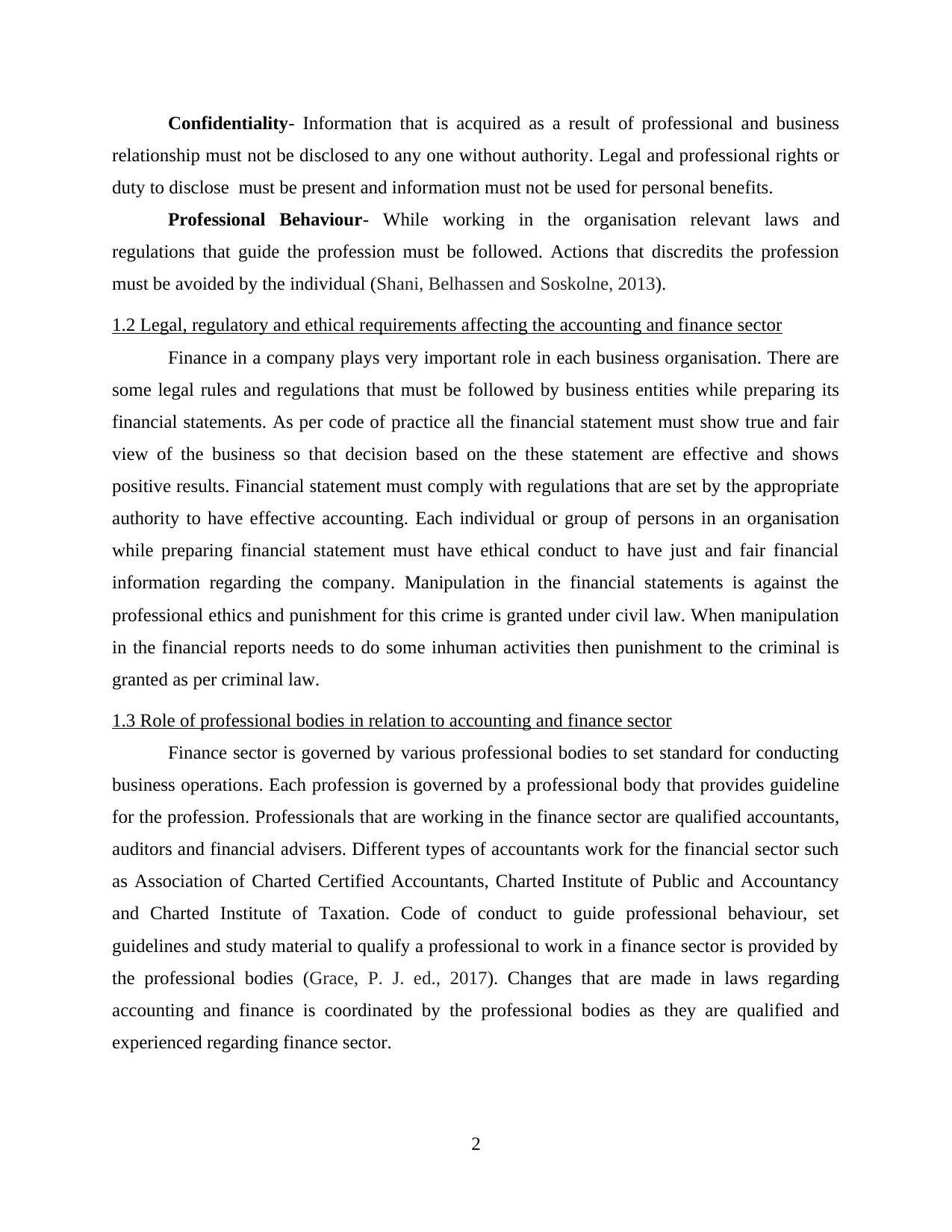
Confidentiality- Information that is acquired as a result of professional and business
relationship must not be disclosed to any one without authority. Legal and professional rights or
duty to disclose must be present and information must not be used for personal benefits.
Professional Behaviour- While working in the organisation relevant laws and
regulations that guide the profession must be followed. Actions that discredits the profession
must be avoided by the individual (Shani, Belhassen and Soskolne, 2013).
1.2 Legal, regulatory and ethical requirements affecting the accounting and finance sector
Finance in a company plays very important role in each business organisation. There are
some legal rules and regulations that must be followed by business entities while preparing its
financial statements. As per code of practice all the financial statement must show true and fair
view of the business so that decision based on the these statement are effective and shows
positive results. Financial statement must comply with regulations that are set by the appropriate
authority to have effective accounting. Each individual or group of persons in an organisation
while preparing financial statement must have ethical conduct to have just and fair financial
information regarding the company. Manipulation in the financial statements is against the
professional ethics and punishment for this crime is granted under civil law. When manipulation
in the financial reports needs to do some inhuman activities then punishment to the criminal is
granted as per criminal law.
1.3 Role of professional bodies in relation to accounting and finance sector
Finance sector is governed by various professional bodies to set standard for conducting
business operations. Each profession is governed by a professional body that provides guideline
for the profession. Professionals that are working in the finance sector are qualified accountants,
auditors and financial advisers. Different types of accountants work for the financial sector such
as Association of Charted Certified Accountants, Charted Institute of Public and Accountancy
and Charted Institute of Taxation. Code of conduct to guide professional behaviour, set
guidelines and study material to qualify a professional to work in a finance sector is provided by
the professional bodies (Grace, P. J. ed., 2017). Changes that are made in laws regarding
accounting and finance is coordinated by the professional bodies as they are qualified and
experienced regarding finance sector.
2
relationship must not be disclosed to any one without authority. Legal and professional rights or
duty to disclose must be present and information must not be used for personal benefits.
Professional Behaviour- While working in the organisation relevant laws and
regulations that guide the profession must be followed. Actions that discredits the profession
must be avoided by the individual (Shani, Belhassen and Soskolne, 2013).
1.2 Legal, regulatory and ethical requirements affecting the accounting and finance sector
Finance in a company plays very important role in each business organisation. There are
some legal rules and regulations that must be followed by business entities while preparing its
financial statements. As per code of practice all the financial statement must show true and fair
view of the business so that decision based on the these statement are effective and shows
positive results. Financial statement must comply with regulations that are set by the appropriate
authority to have effective accounting. Each individual or group of persons in an organisation
while preparing financial statement must have ethical conduct to have just and fair financial
information regarding the company. Manipulation in the financial statements is against the
professional ethics and punishment for this crime is granted under civil law. When manipulation
in the financial reports needs to do some inhuman activities then punishment to the criminal is
granted as per criminal law.
1.3 Role of professional bodies in relation to accounting and finance sector
Finance sector is governed by various professional bodies to set standard for conducting
business operations. Each profession is governed by a professional body that provides guideline
for the profession. Professionals that are working in the finance sector are qualified accountants,
auditors and financial advisers. Different types of accountants work for the financial sector such
as Association of Charted Certified Accountants, Charted Institute of Public and Accountancy
and Charted Institute of Taxation. Code of conduct to guide professional behaviour, set
guidelines and study material to qualify a professional to work in a finance sector is provided by
the professional bodies (Grace, P. J. ed., 2017). Changes that are made in laws regarding
accounting and finance is coordinated by the professional bodies as they are qualified and
experienced regarding finance sector.
2
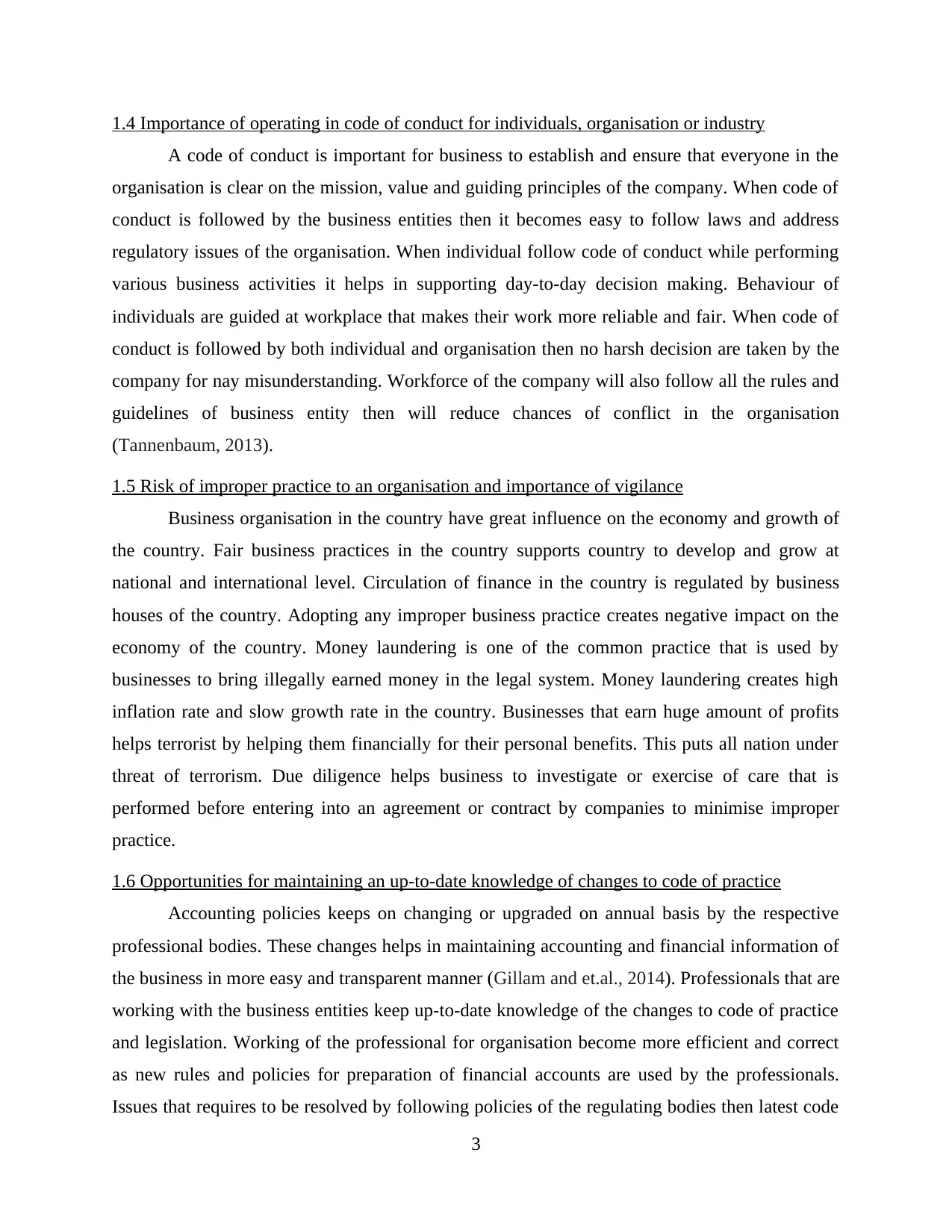
1.4 Importance of operating in code of conduct for individuals, organisation or industry
A code of conduct is important for business to establish and ensure that everyone in the
organisation is clear on the mission, value and guiding principles of the company. When code of
conduct is followed by the business entities then it becomes easy to follow laws and address
regulatory issues of the organisation. When individual follow code of conduct while performing
various business activities it helps in supporting day-to-day decision making. Behaviour of
individuals are guided at workplace that makes their work more reliable and fair. When code of
conduct is followed by both individual and organisation then no harsh decision are taken by the
company for nay misunderstanding. Workforce of the company will also follow all the rules and
guidelines of business entity then will reduce chances of conflict in the organisation
(Tannenbaum, 2013).
1.5 Risk of improper practice to an organisation and importance of vigilance
Business organisation in the country have great influence on the economy and growth of
the country. Fair business practices in the country supports country to develop and grow at
national and international level. Circulation of finance in the country is regulated by business
houses of the country. Adopting any improper business practice creates negative impact on the
economy of the country. Money laundering is one of the common practice that is used by
businesses to bring illegally earned money in the legal system. Money laundering creates high
inflation rate and slow growth rate in the country. Businesses that earn huge amount of profits
helps terrorist by helping them financially for their personal benefits. This puts all nation under
threat of terrorism. Due diligence helps business to investigate or exercise of care that is
performed before entering into an agreement or contract by companies to minimise improper
practice.
1.6 Opportunities for maintaining an up-to-date knowledge of changes to code of practice
Accounting policies keeps on changing or upgraded on annual basis by the respective
professional bodies. These changes helps in maintaining accounting and financial information of
the business in more easy and transparent manner (Gillam and et.al., 2014). Professionals that are
working with the business entities keep up-to-date knowledge of the changes to code of practice
and legislation. Working of the professional for organisation become more efficient and correct
as new rules and policies for preparation of financial accounts are used by the professionals.
Issues that requires to be resolved by following policies of the regulating bodies then latest code
3
A code of conduct is important for business to establish and ensure that everyone in the
organisation is clear on the mission, value and guiding principles of the company. When code of
conduct is followed by the business entities then it becomes easy to follow laws and address
regulatory issues of the organisation. When individual follow code of conduct while performing
various business activities it helps in supporting day-to-day decision making. Behaviour of
individuals are guided at workplace that makes their work more reliable and fair. When code of
conduct is followed by both individual and organisation then no harsh decision are taken by the
company for nay misunderstanding. Workforce of the company will also follow all the rules and
guidelines of business entity then will reduce chances of conflict in the organisation
(Tannenbaum, 2013).
1.5 Risk of improper practice to an organisation and importance of vigilance
Business organisation in the country have great influence on the economy and growth of
the country. Fair business practices in the country supports country to develop and grow at
national and international level. Circulation of finance in the country is regulated by business
houses of the country. Adopting any improper business practice creates negative impact on the
economy of the country. Money laundering is one of the common practice that is used by
businesses to bring illegally earned money in the legal system. Money laundering creates high
inflation rate and slow growth rate in the country. Businesses that earn huge amount of profits
helps terrorist by helping them financially for their personal benefits. This puts all nation under
threat of terrorism. Due diligence helps business to investigate or exercise of care that is
performed before entering into an agreement or contract by companies to minimise improper
practice.
1.6 Opportunities for maintaining an up-to-date knowledge of changes to code of practice
Accounting policies keeps on changing or upgraded on annual basis by the respective
professional bodies. These changes helps in maintaining accounting and financial information of
the business in more easy and transparent manner (Gillam and et.al., 2014). Professionals that are
working with the business entities keep up-to-date knowledge of the changes to code of practice
and legislation. Working of the professional for organisation become more efficient and correct
as new rules and policies for preparation of financial accounts are used by the professionals.
Issues that requires to be resolved by following policies of the regulating bodies then latest code
3
⊘ This is a preview!⊘
Do you want full access?
Subscribe today to unlock all pages.

Trusted by 1+ million students worldwide
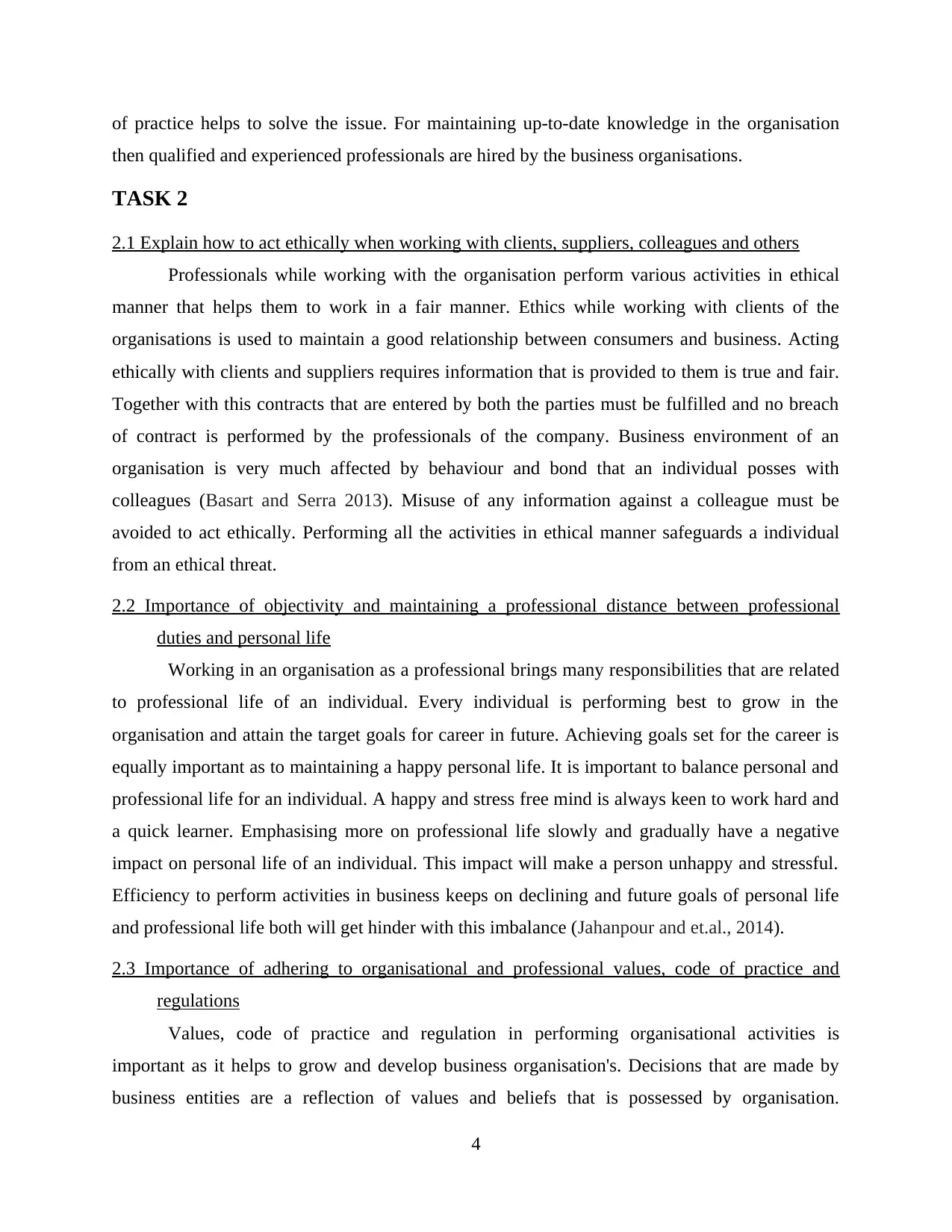
of practice helps to solve the issue. For maintaining up-to-date knowledge in the organisation
then qualified and experienced professionals are hired by the business organisations.
TASK 2
2.1 Explain how to act ethically when working with clients, suppliers, colleagues and others
Professionals while working with the organisation perform various activities in ethical
manner that helps them to work in a fair manner. Ethics while working with clients of the
organisations is used to maintain a good relationship between consumers and business. Acting
ethically with clients and suppliers requires information that is provided to them is true and fair.
Together with this contracts that are entered by both the parties must be fulfilled and no breach
of contract is performed by the professionals of the company. Business environment of an
organisation is very much affected by behaviour and bond that an individual posses with
colleagues (Basart and Serra 2013). Misuse of any information against a colleague must be
avoided to act ethically. Performing all the activities in ethical manner safeguards a individual
from an ethical threat.
2.2 Importance of objectivity and maintaining a professional distance between professional
duties and personal life
Working in an organisation as a professional brings many responsibilities that are related
to professional life of an individual. Every individual is performing best to grow in the
organisation and attain the target goals for career in future. Achieving goals set for the career is
equally important as to maintaining a happy personal life. It is important to balance personal and
professional life for an individual. A happy and stress free mind is always keen to work hard and
a quick learner. Emphasising more on professional life slowly and gradually have a negative
impact on personal life of an individual. This impact will make a person unhappy and stressful.
Efficiency to perform activities in business keeps on declining and future goals of personal life
and professional life both will get hinder with this imbalance (Jahanpour and et.al., 2014).
2.3 Importance of adhering to organisational and professional values, code of practice and
regulations
Values, code of practice and regulation in performing organisational activities is
important as it helps to grow and develop business organisation's. Decisions that are made by
business entities are a reflection of values and beliefs that is possessed by organisation.
4
then qualified and experienced professionals are hired by the business organisations.
TASK 2
2.1 Explain how to act ethically when working with clients, suppliers, colleagues and others
Professionals while working with the organisation perform various activities in ethical
manner that helps them to work in a fair manner. Ethics while working with clients of the
organisations is used to maintain a good relationship between consumers and business. Acting
ethically with clients and suppliers requires information that is provided to them is true and fair.
Together with this contracts that are entered by both the parties must be fulfilled and no breach
of contract is performed by the professionals of the company. Business environment of an
organisation is very much affected by behaviour and bond that an individual posses with
colleagues (Basart and Serra 2013). Misuse of any information against a colleague must be
avoided to act ethically. Performing all the activities in ethical manner safeguards a individual
from an ethical threat.
2.2 Importance of objectivity and maintaining a professional distance between professional
duties and personal life
Working in an organisation as a professional brings many responsibilities that are related
to professional life of an individual. Every individual is performing best to grow in the
organisation and attain the target goals for career in future. Achieving goals set for the career is
equally important as to maintaining a happy personal life. It is important to balance personal and
professional life for an individual. A happy and stress free mind is always keen to work hard and
a quick learner. Emphasising more on professional life slowly and gradually have a negative
impact on personal life of an individual. This impact will make a person unhappy and stressful.
Efficiency to perform activities in business keeps on declining and future goals of personal life
and professional life both will get hinder with this imbalance (Jahanpour and et.al., 2014).
2.3 Importance of adhering to organisational and professional values, code of practice and
regulations
Values, code of practice and regulation in performing organisational activities is
important as it helps to grow and develop business organisation's. Decisions that are made by
business entities are a reflection of values and beliefs that is possessed by organisation.
4
Paraphrase This Document
Need a fresh take? Get an instant paraphrase of this document with our AI Paraphraser
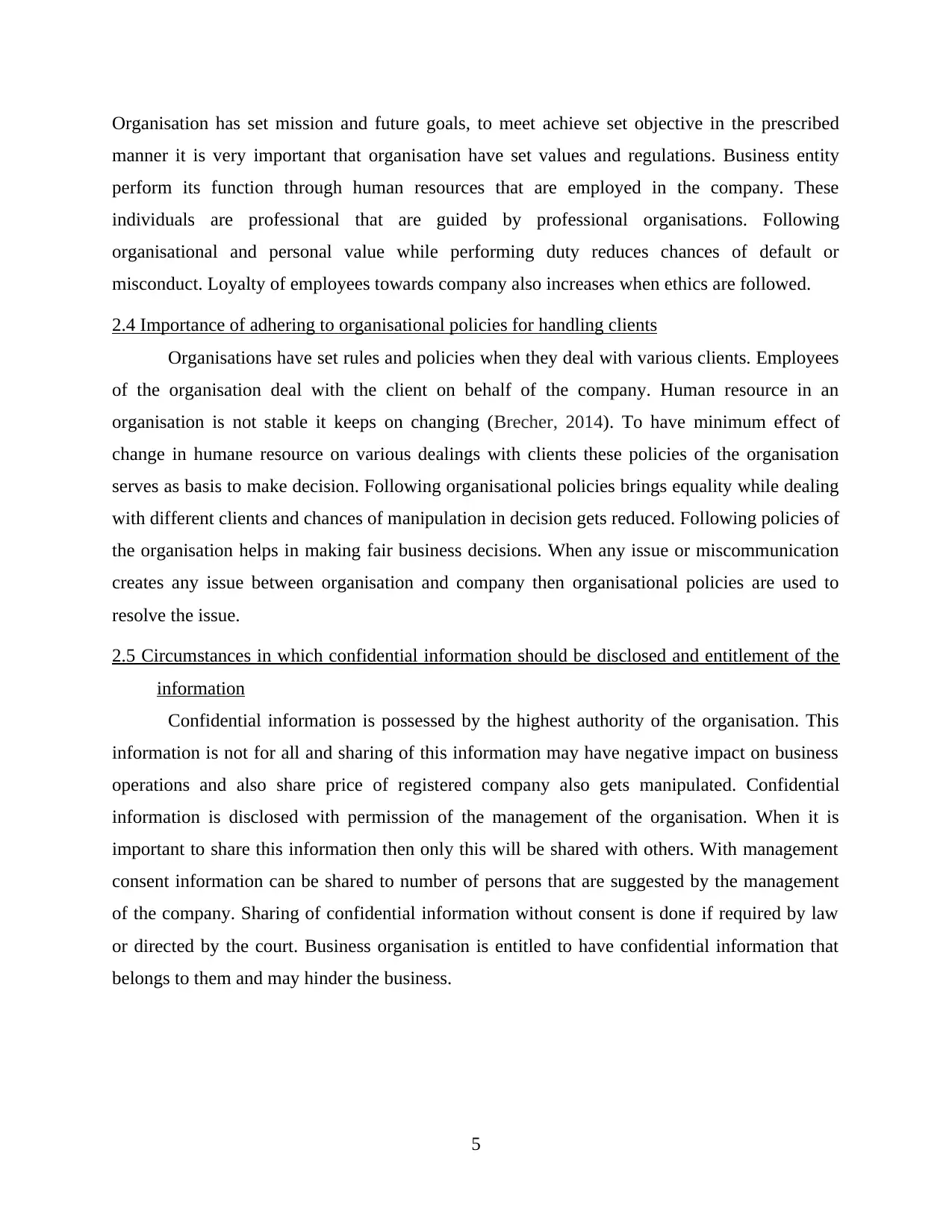
Organisation has set mission and future goals, to meet achieve set objective in the prescribed
manner it is very important that organisation have set values and regulations. Business entity
perform its function through human resources that are employed in the company. These
individuals are professional that are guided by professional organisations. Following
organisational and personal value while performing duty reduces chances of default or
misconduct. Loyalty of employees towards company also increases when ethics are followed.
2.4 Importance of adhering to organisational policies for handling clients
Organisations have set rules and policies when they deal with various clients. Employees
of the organisation deal with the client on behalf of the company. Human resource in an
organisation is not stable it keeps on changing (Brecher, 2014). To have minimum effect of
change in humane resource on various dealings with clients these policies of the organisation
serves as basis to make decision. Following organisational policies brings equality while dealing
with different clients and chances of manipulation in decision gets reduced. Following policies of
the organisation helps in making fair business decisions. When any issue or miscommunication
creates any issue between organisation and company then organisational policies are used to
resolve the issue.
2.5 Circumstances in which confidential information should be disclosed and entitlement of the
information
Confidential information is possessed by the highest authority of the organisation. This
information is not for all and sharing of this information may have negative impact on business
operations and also share price of registered company also gets manipulated. Confidential
information is disclosed with permission of the management of the organisation. When it is
important to share this information then only this will be shared with others. With management
consent information can be shared to number of persons that are suggested by the management
of the company. Sharing of confidential information without consent is done if required by law
or directed by the court. Business organisation is entitled to have confidential information that
belongs to them and may hinder the business.
5
manner it is very important that organisation have set values and regulations. Business entity
perform its function through human resources that are employed in the company. These
individuals are professional that are guided by professional organisations. Following
organisational and personal value while performing duty reduces chances of default or
misconduct. Loyalty of employees towards company also increases when ethics are followed.
2.4 Importance of adhering to organisational policies for handling clients
Organisations have set rules and policies when they deal with various clients. Employees
of the organisation deal with the client on behalf of the company. Human resource in an
organisation is not stable it keeps on changing (Brecher, 2014). To have minimum effect of
change in humane resource on various dealings with clients these policies of the organisation
serves as basis to make decision. Following organisational policies brings equality while dealing
with different clients and chances of manipulation in decision gets reduced. Following policies of
the organisation helps in making fair business decisions. When any issue or miscommunication
creates any issue between organisation and company then organisational policies are used to
resolve the issue.
2.5 Circumstances in which confidential information should be disclosed and entitlement of the
information
Confidential information is possessed by the highest authority of the organisation. This
information is not for all and sharing of this information may have negative impact on business
operations and also share price of registered company also gets manipulated. Confidential
information is disclosed with permission of the management of the organisation. When it is
important to share this information then only this will be shared with others. With management
consent information can be shared to number of persons that are suggested by the management
of the company. Sharing of confidential information without consent is done if required by law
or directed by the court. Business organisation is entitled to have confidential information that
belongs to them and may hinder the business.
5
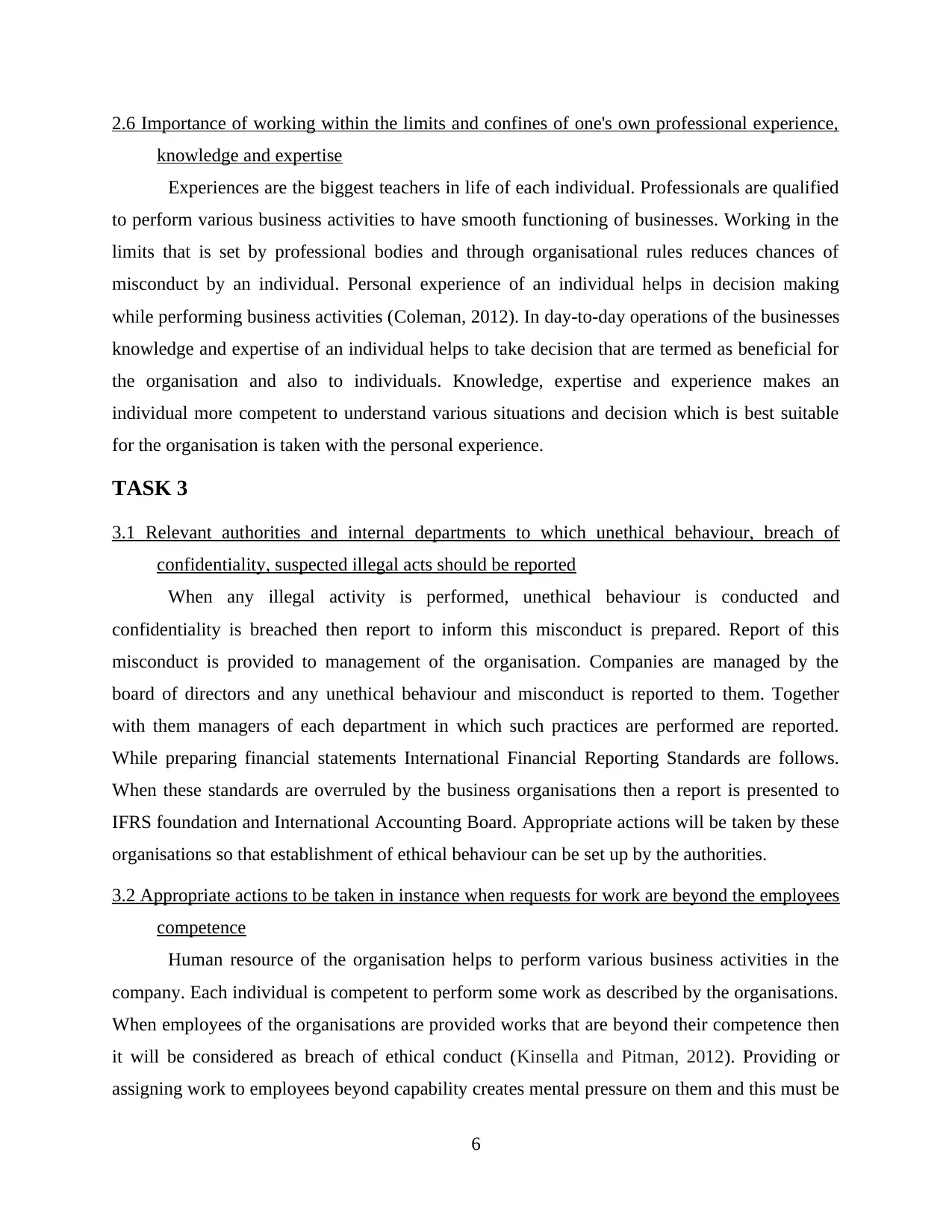
2.6 Importance of working within the limits and confines of one's own professional experience,
knowledge and expertise
Experiences are the biggest teachers in life of each individual. Professionals are qualified
to perform various business activities to have smooth functioning of businesses. Working in the
limits that is set by professional bodies and through organisational rules reduces chances of
misconduct by an individual. Personal experience of an individual helps in decision making
while performing business activities (Coleman, 2012). In day-to-day operations of the businesses
knowledge and expertise of an individual helps to take decision that are termed as beneficial for
the organisation and also to individuals. Knowledge, expertise and experience makes an
individual more competent to understand various situations and decision which is best suitable
for the organisation is taken with the personal experience.
TASK 3
3.1 Relevant authorities and internal departments to which unethical behaviour, breach of
confidentiality, suspected illegal acts should be reported
When any illegal activity is performed, unethical behaviour is conducted and
confidentiality is breached then report to inform this misconduct is prepared. Report of this
misconduct is provided to management of the organisation. Companies are managed by the
board of directors and any unethical behaviour and misconduct is reported to them. Together
with them managers of each department in which such practices are performed are reported.
While preparing financial statements International Financial Reporting Standards are follows.
When these standards are overruled by the business organisations then a report is presented to
IFRS foundation and International Accounting Board. Appropriate actions will be taken by these
organisations so that establishment of ethical behaviour can be set up by the authorities.
3.2 Appropriate actions to be taken in instance when requests for work are beyond the employees
competence
Human resource of the organisation helps to perform various business activities in the
company. Each individual is competent to perform some work as described by the organisations.
When employees of the organisations are provided works that are beyond their competence then
it will be considered as breach of ethical conduct (Kinsella and Pitman, 2012). Providing or
assigning work to employees beyond capability creates mental pressure on them and this must be
6
knowledge and expertise
Experiences are the biggest teachers in life of each individual. Professionals are qualified
to perform various business activities to have smooth functioning of businesses. Working in the
limits that is set by professional bodies and through organisational rules reduces chances of
misconduct by an individual. Personal experience of an individual helps in decision making
while performing business activities (Coleman, 2012). In day-to-day operations of the businesses
knowledge and expertise of an individual helps to take decision that are termed as beneficial for
the organisation and also to individuals. Knowledge, expertise and experience makes an
individual more competent to understand various situations and decision which is best suitable
for the organisation is taken with the personal experience.
TASK 3
3.1 Relevant authorities and internal departments to which unethical behaviour, breach of
confidentiality, suspected illegal acts should be reported
When any illegal activity is performed, unethical behaviour is conducted and
confidentiality is breached then report to inform this misconduct is prepared. Report of this
misconduct is provided to management of the organisation. Companies are managed by the
board of directors and any unethical behaviour and misconduct is reported to them. Together
with them managers of each department in which such practices are performed are reported.
While preparing financial statements International Financial Reporting Standards are follows.
When these standards are overruled by the business organisations then a report is presented to
IFRS foundation and International Accounting Board. Appropriate actions will be taken by these
organisations so that establishment of ethical behaviour can be set up by the authorities.
3.2 Appropriate actions to be taken in instance when requests for work are beyond the employees
competence
Human resource of the organisation helps to perform various business activities in the
company. Each individual is competent to perform some work as described by the organisations.
When employees of the organisations are provided works that are beyond their competence then
it will be considered as breach of ethical conduct (Kinsella and Pitman, 2012). Providing or
assigning work to employees beyond capability creates mental pressure on them and this must be
6
⊘ This is a preview!⊘
Do you want full access?
Subscribe today to unlock all pages.

Trusted by 1+ million students worldwide
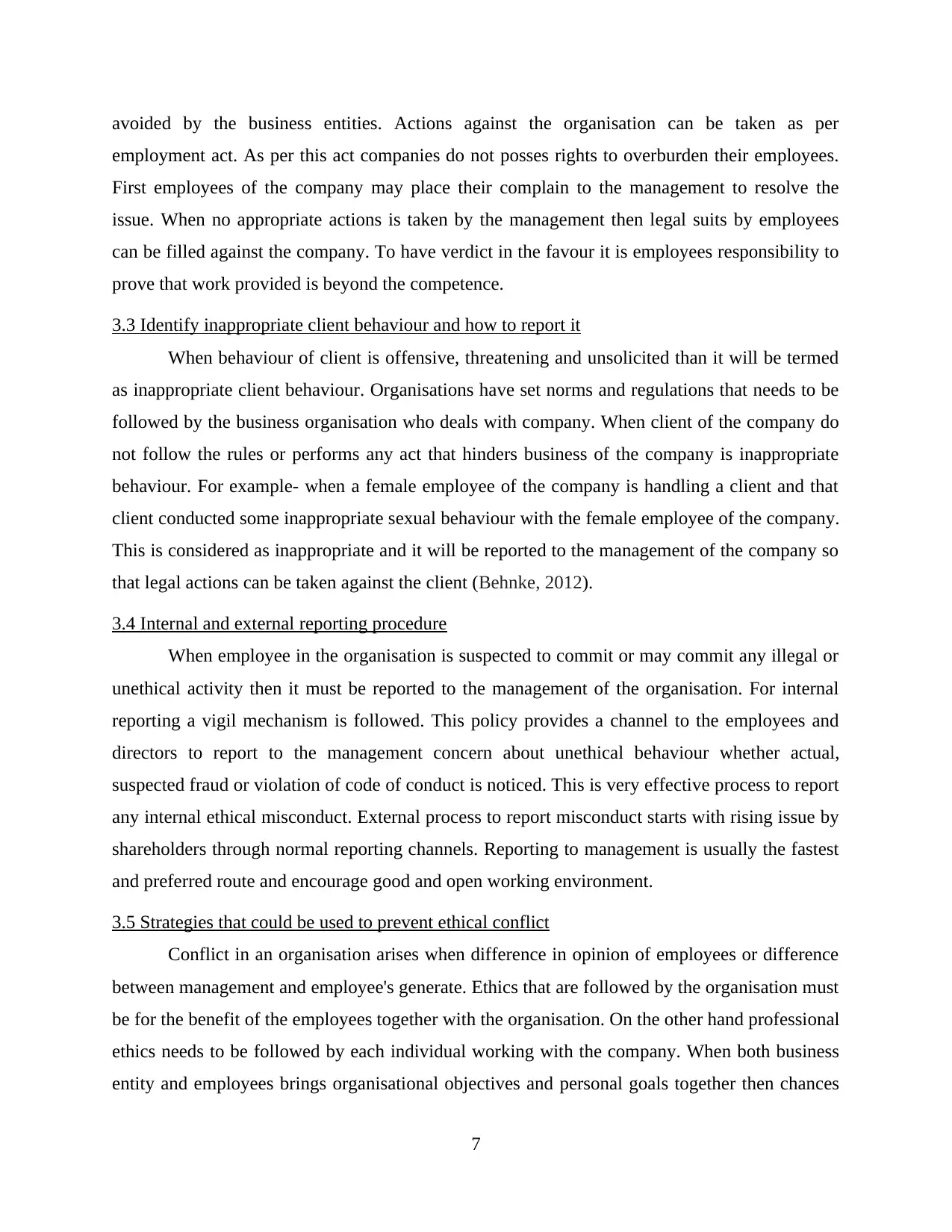
avoided by the business entities. Actions against the organisation can be taken as per
employment act. As per this act companies do not posses rights to overburden their employees.
First employees of the company may place their complain to the management to resolve the
issue. When no appropriate actions is taken by the management then legal suits by employees
can be filled against the company. To have verdict in the favour it is employees responsibility to
prove that work provided is beyond the competence.
3.3 Identify inappropriate client behaviour and how to report it
When behaviour of client is offensive, threatening and unsolicited than it will be termed
as inappropriate client behaviour. Organisations have set norms and regulations that needs to be
followed by the business organisation who deals with company. When client of the company do
not follow the rules or performs any act that hinders business of the company is inappropriate
behaviour. For example- when a female employee of the company is handling a client and that
client conducted some inappropriate sexual behaviour with the female employee of the company.
This is considered as inappropriate and it will be reported to the management of the company so
that legal actions can be taken against the client (Behnke, 2012).
3.4 Internal and external reporting procedure
When employee in the organisation is suspected to commit or may commit any illegal or
unethical activity then it must be reported to the management of the organisation. For internal
reporting a vigil mechanism is followed. This policy provides a channel to the employees and
directors to report to the management concern about unethical behaviour whether actual,
suspected fraud or violation of code of conduct is noticed. This is very effective process to report
any internal ethical misconduct. External process to report misconduct starts with rising issue by
shareholders through normal reporting channels. Reporting to management is usually the fastest
and preferred route and encourage good and open working environment.
3.5 Strategies that could be used to prevent ethical conflict
Conflict in an organisation arises when difference in opinion of employees or difference
between management and employee's generate. Ethics that are followed by the organisation must
be for the benefit of the employees together with the organisation. On the other hand professional
ethics needs to be followed by each individual working with the company. When both business
entity and employees brings organisational objectives and personal goals together then chances
7
employment act. As per this act companies do not posses rights to overburden their employees.
First employees of the company may place their complain to the management to resolve the
issue. When no appropriate actions is taken by the management then legal suits by employees
can be filled against the company. To have verdict in the favour it is employees responsibility to
prove that work provided is beyond the competence.
3.3 Identify inappropriate client behaviour and how to report it
When behaviour of client is offensive, threatening and unsolicited than it will be termed
as inappropriate client behaviour. Organisations have set norms and regulations that needs to be
followed by the business organisation who deals with company. When client of the company do
not follow the rules or performs any act that hinders business of the company is inappropriate
behaviour. For example- when a female employee of the company is handling a client and that
client conducted some inappropriate sexual behaviour with the female employee of the company.
This is considered as inappropriate and it will be reported to the management of the company so
that legal actions can be taken against the client (Behnke, 2012).
3.4 Internal and external reporting procedure
When employee in the organisation is suspected to commit or may commit any illegal or
unethical activity then it must be reported to the management of the organisation. For internal
reporting a vigil mechanism is followed. This policy provides a channel to the employees and
directors to report to the management concern about unethical behaviour whether actual,
suspected fraud or violation of code of conduct is noticed. This is very effective process to report
any internal ethical misconduct. External process to report misconduct starts with rising issue by
shareholders through normal reporting channels. Reporting to management is usually the fastest
and preferred route and encourage good and open working environment.
3.5 Strategies that could be used to prevent ethical conflict
Conflict in an organisation arises when difference in opinion of employees or difference
between management and employee's generate. Ethics that are followed by the organisation must
be for the benefit of the employees together with the organisation. On the other hand professional
ethics needs to be followed by each individual working with the company. When both business
entity and employees brings organisational objectives and personal goals together then chances
7
Paraphrase This Document
Need a fresh take? Get an instant paraphrase of this document with our AI Paraphraser
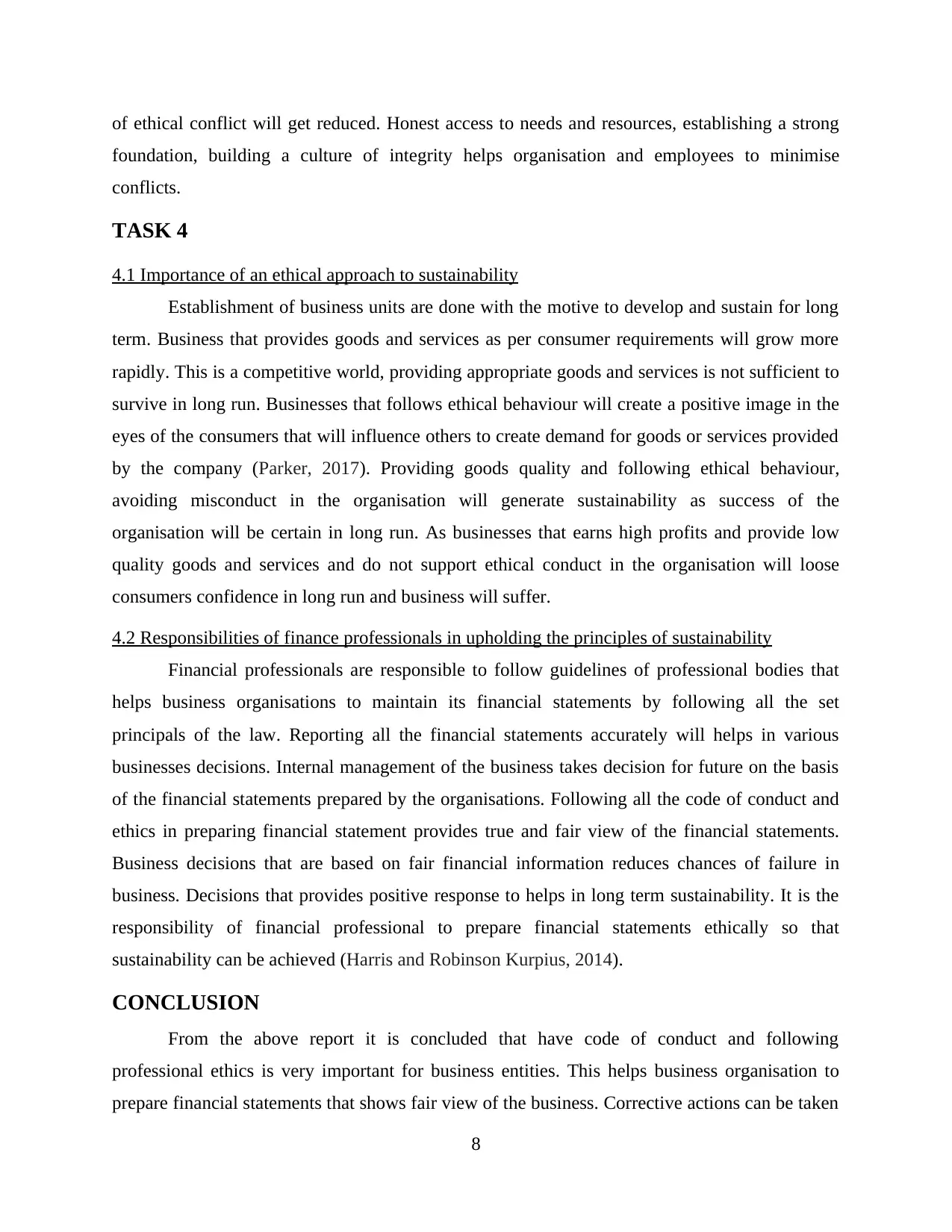
of ethical conflict will get reduced. Honest access to needs and resources, establishing a strong
foundation, building a culture of integrity helps organisation and employees to minimise
conflicts.
TASK 4
4.1 Importance of an ethical approach to sustainability
Establishment of business units are done with the motive to develop and sustain for long
term. Business that provides goods and services as per consumer requirements will grow more
rapidly. This is a competitive world, providing appropriate goods and services is not sufficient to
survive in long run. Businesses that follows ethical behaviour will create a positive image in the
eyes of the consumers that will influence others to create demand for goods or services provided
by the company (Parker, 2017). Providing goods quality and following ethical behaviour,
avoiding misconduct in the organisation will generate sustainability as success of the
organisation will be certain in long run. As businesses that earns high profits and provide low
quality goods and services and do not support ethical conduct in the organisation will loose
consumers confidence in long run and business will suffer.
4.2 Responsibilities of finance professionals in upholding the principles of sustainability
Financial professionals are responsible to follow guidelines of professional bodies that
helps business organisations to maintain its financial statements by following all the set
principals of the law. Reporting all the financial statements accurately will helps in various
businesses decisions. Internal management of the business takes decision for future on the basis
of the financial statements prepared by the organisations. Following all the code of conduct and
ethics in preparing financial statement provides true and fair view of the financial statements.
Business decisions that are based on fair financial information reduces chances of failure in
business. Decisions that provides positive response to helps in long term sustainability. It is the
responsibility of financial professional to prepare financial statements ethically so that
sustainability can be achieved (Harris and Robinson Kurpius, 2014).
CONCLUSION
From the above report it is concluded that have code of conduct and following
professional ethics is very important for business entities. This helps business organisation to
prepare financial statements that shows fair view of the business. Corrective actions can be taken
8
foundation, building a culture of integrity helps organisation and employees to minimise
conflicts.
TASK 4
4.1 Importance of an ethical approach to sustainability
Establishment of business units are done with the motive to develop and sustain for long
term. Business that provides goods and services as per consumer requirements will grow more
rapidly. This is a competitive world, providing appropriate goods and services is not sufficient to
survive in long run. Businesses that follows ethical behaviour will create a positive image in the
eyes of the consumers that will influence others to create demand for goods or services provided
by the company (Parker, 2017). Providing goods quality and following ethical behaviour,
avoiding misconduct in the organisation will generate sustainability as success of the
organisation will be certain in long run. As businesses that earns high profits and provide low
quality goods and services and do not support ethical conduct in the organisation will loose
consumers confidence in long run and business will suffer.
4.2 Responsibilities of finance professionals in upholding the principles of sustainability
Financial professionals are responsible to follow guidelines of professional bodies that
helps business organisations to maintain its financial statements by following all the set
principals of the law. Reporting all the financial statements accurately will helps in various
businesses decisions. Internal management of the business takes decision for future on the basis
of the financial statements prepared by the organisations. Following all the code of conduct and
ethics in preparing financial statement provides true and fair view of the financial statements.
Business decisions that are based on fair financial information reduces chances of failure in
business. Decisions that provides positive response to helps in long term sustainability. It is the
responsibility of financial professional to prepare financial statements ethically so that
sustainability can be achieved (Harris and Robinson Kurpius, 2014).
CONCLUSION
From the above report it is concluded that have code of conduct and following
professional ethics is very important for business entities. This helps business organisation to
prepare financial statements that shows fair view of the business. Corrective actions can be taken
8
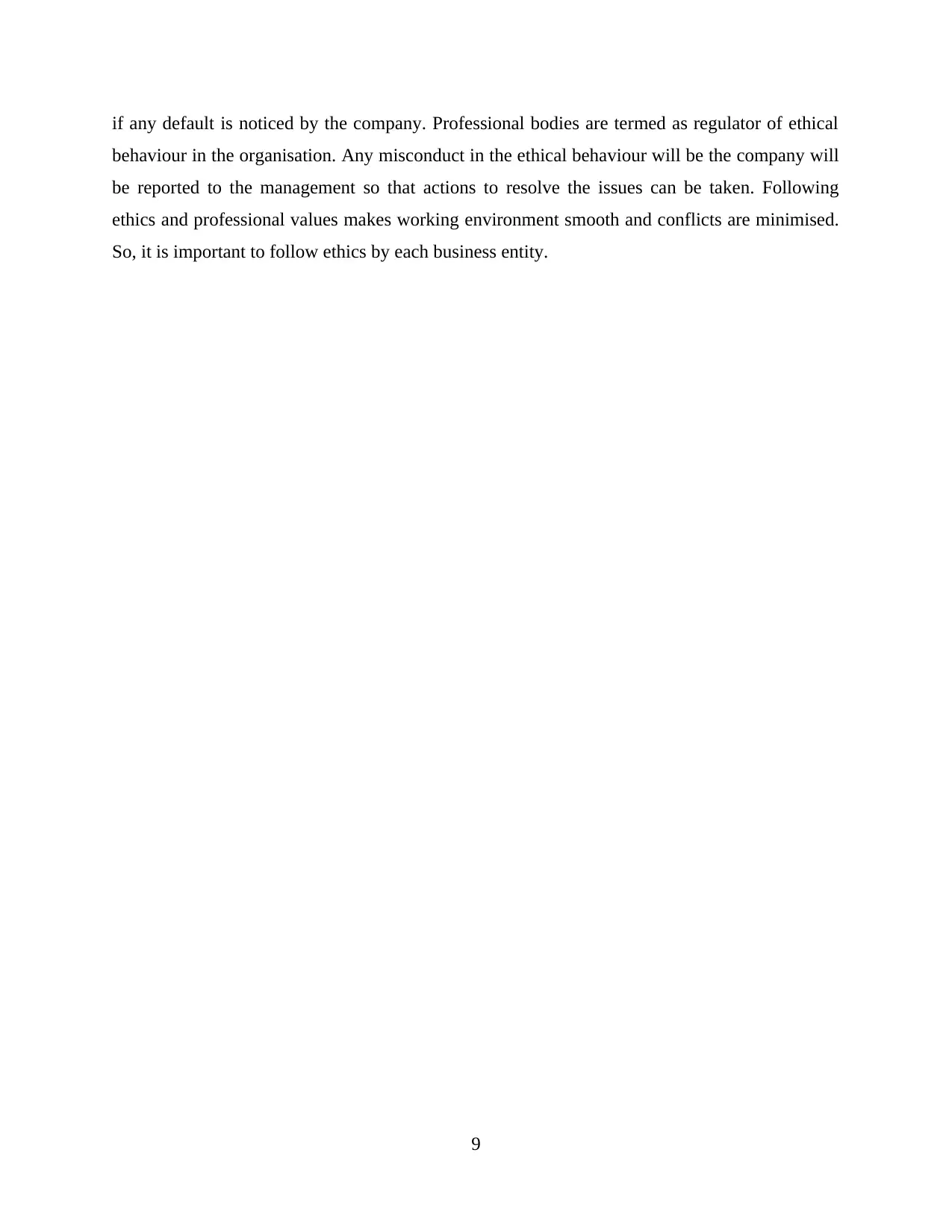
if any default is noticed by the company. Professional bodies are termed as regulator of ethical
behaviour in the organisation. Any misconduct in the ethical behaviour will be the company will
be reported to the management so that actions to resolve the issues can be taken. Following
ethics and professional values makes working environment smooth and conflicts are minimised.
So, it is important to follow ethics by each business entity.
9
behaviour in the organisation. Any misconduct in the ethical behaviour will be the company will
be reported to the management so that actions to resolve the issues can be taken. Following
ethics and professional values makes working environment smooth and conflicts are minimised.
So, it is important to follow ethics by each business entity.
9
⊘ This is a preview!⊘
Do you want full access?
Subscribe today to unlock all pages.

Trusted by 1+ million students worldwide
1 out of 13
Related Documents
Your All-in-One AI-Powered Toolkit for Academic Success.
+13062052269
info@desklib.com
Available 24*7 on WhatsApp / Email
![[object Object]](/_next/static/media/star-bottom.7253800d.svg)
Unlock your academic potential
Copyright © 2020–2026 A2Z Services. All Rights Reserved. Developed and managed by ZUCOL.





